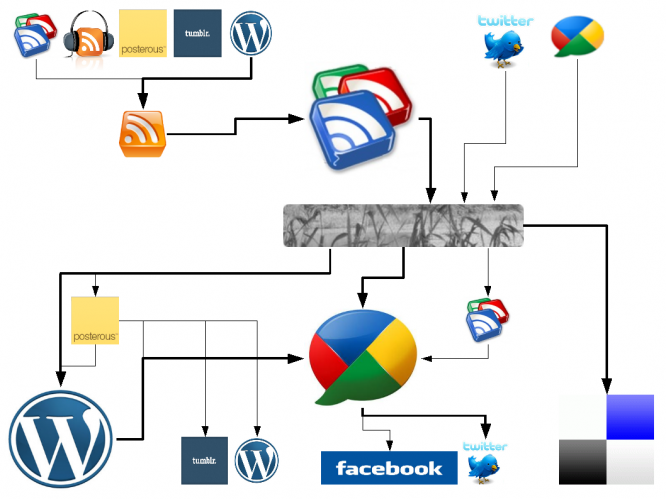Now this has evolved into one hot topic, huh? And so it’s about time to sort, aggregate and systematize my thoughts on the smart knowledge workers workplace and lifestream configuration.
Well, I was blogging about my personal workspace before, and that post and this one have blurring boundaries. See there for my general setup, my choice of browsers et al. Here it’s about processes and ways to channel and refine content.
I got triggered by various posts and inspirations – one being recent posts by Robert Scoble (on what it needs for better content curation), Louis Gray (on how he proceeds with sharing content), Steph Booth (on why she likes Tumblr and how it fits into her lifestream), Andi Gohr (on his lifestream configuration) and Mac Slocum (on how buzz can be perceived as hybrid blogging). Other inspirations include people asking me on buzz how I share links (Christian, yes!), why I continue to use and enjoy buzz (DT, yes!), and how I refine the contents I share.
All this made me compile this post to share some of the tweaks and lifehacks I have chosen to tailor content I share, how I get a grip on the topics myriad of people whose work I am following et al. Basically most of these tweaks are in place to avoid needless redundancy, ie. channels get selected depending upon content (and audience) – hoping that the stuff I share to different platforms will be interesting (or valuable at times).
So here’s the basic setup:
 Complicated infographic, yes. So let me explain: Basically I am depicted in the middle (ie. the neat frogpond logo) – and I am busy filtering, refining and curating content (from the top down to the bottom).
Complicated infographic, yes. So let me explain: Basically I am depicted in the middle (ie. the neat frogpond logo) – and I am busy filtering, refining and curating content (from the top down to the bottom).
Most of the things I am learning on the web reach me via RSS – and in my reader of choice, the Google Reader. Currently I am subscribed to +1000 feeds, including podcasts, Tumblr feeds, a ton of blog feeds, searches and everything – all sorted into folders (yes, these folders have varying importance to me, you sure believe me when I say that the _fun folder is less important and funny than the _e20 folder, will you?). Moreover the Google Reader is the focal point for all the recommendations I am subscribed to, ie. the Google Reader items my buzz contacts and friends are sharing (top left). This is the lions share – and you will understand that I basically live and breathe by RSS.
Other sources of inspiration and content include my buzz lifestream (now following 400 people) and my twitter lifestream (following roundabout 1600) – and the usual suspects, ie. mail, skype, IRC, Google Talk, telcos, talking to actual people, working with customers et al.
All of this – remixed, refined and reworked – gets pushed out via various channels again, the easiest being my delicious bookmarks (bottom right). I am bookmarking and tagging a lot – yet, I must confess that not everything I hamster is public. As of today roundabout 75% of my bookmarks are marked private – I bookmark them so that I alone can find them again, come time. The 25% of my delicious bookmarks that I think are interesting to share in public get spliced into the main feed of frogpond by Feedburner.
Then I am blogging – in WordPress blogs here and there. Mostly I am pretty happy with generic posting, but sometimes it’s more convenient via Posterous, ie. via frogpond.posterous.com. This Posterous blog also allows for manual autoposting to my tumblr, a range of self-hosted internal collaboration wordpress blogs (my interpretations of a linkblog and an aggregation site), to Facebook, to Friendfeed and even to delicious. Heck, I could even tweet directly from Posterous …
All of the posts that make it to my regular blogs are syndicated to Google buzz – which in turn is feeding Twitter (via the Feedburner socialize solution, employing Pubsubhubbub) and Facebook (via Twitterfeed). Notice that I only feed native and generic buzz to Facebook, no @-Replies, no Retweeting, no redundancy, no nothing. And no, it’s not because I like Facebook and I want to keep it clean and easy. It’s more the other way round – if you want to interact with me you better use the spaces I engage in, ie. buzz and to a lesser extent Twitter. No point in aggregating my replies into Facebook when nobody there knows why I am replying ..
Ok, onto buzz – you notice it’s bigger than the rest (hey, almost as huge as Google Reader …). This is for a reason: I just love the platform. And I use it daily. Via mobile access or via old-school generic usage. Daily.
Into buzz there goes
a) generic buzzes – say I want to macroblog a link or an image or, err a tweet
b) my GReader recommendations (GReader is linked with buzz, ie. every time I click on “recommend” in Reader the item gets added to my lifestream)
c) all content I share via my secondary Posterous-Blog buzzpond (this is directly linked to buzz, while frogpond.posterous.com ain’t linked).
d) content from my blogs
e) all mobile (picture) buzzing and all public Flickr additions 😉
Now I should elaborate as to why buzz has hit a nerve with me, but I will keep this for another post …


 Weekend at last, a little gap in between – and a bit of time to blog some of the things that happened during the week – like:
Weekend at last, a little gap in between – and a bit of time to blog some of the things that happened during the week – like: Ah, all the buzz about
Ah, all the buzz about